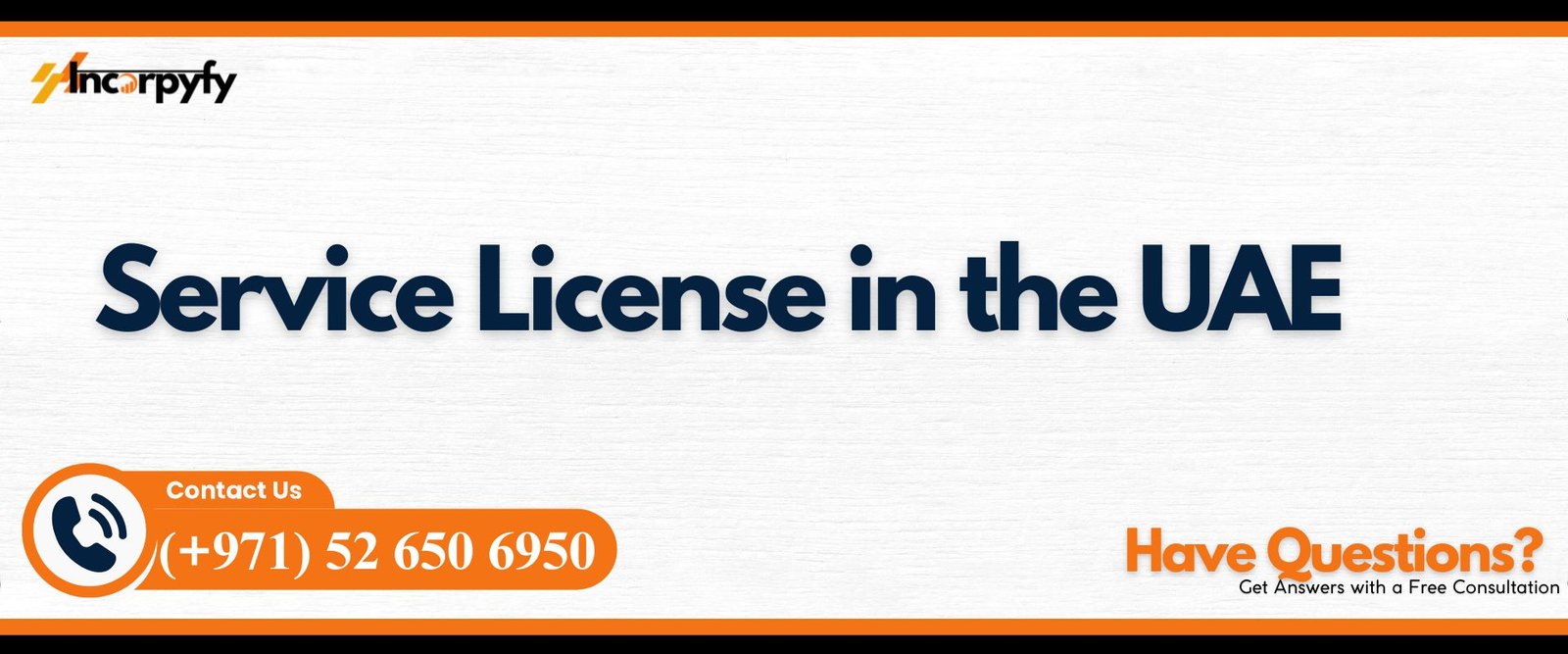
The United Arab Emirates is one of the most dynamic economies in the Middle East. With its liberal trade policies, investor-friendly environment, and global connectivity, it has become a top destination for entrepreneurs worldwide. Among the different types of business licenses available, the service license in the UAE is one of the most popular choices. It is designed for individuals and companies offering professional services rather than trading goods.
Whether you are an IT consultant, legal advisor, marketing professional, or management consultant, obtaining a service license is the first step to legally establishing your operations in the UAE. This guide explains everything you need to know—from eligibility and benefits to costs, requirements, and application procedures.
What is a Service License in the UAE?
A service license in the UAE allows individuals and businesses to provide professional services rather than trading physical products. It covers fields such as consulting, marketing, IT, accounting, engineering, and more.
Scope of Services Covered
- Legal and financial consultancy
- IT and software services
- Management and HR consultancy
- Marketing and advertising services
- Healthcare and medical consultancy
- Design, engineering, and architecture services
This license is ideal for professionals who want to leverage their expertise and offer specialized knowledge to clients in the UAE and abroad.
Importance of a Service License in UAE
Getting a service license in the UAE is not only a legal requirement but also adds credibility and trust to your business.
Why It Matters
- Provides legal recognition to your business
- Allows access to the UAE and GCC markets
- Builds trust with clients, partners, and investors
- Ensures compliance with government regulations
Without a service license, offering consultancy or professional services can lead to penalties, business closure, and reputational damage.
Benefits of Obtaining a Service License in the UAE
A UAE service license offers entrepreneurs credibility, ownership freedom in free zones, and access to both local and international markets. Businesses also enjoy tax advantages, flexible activities under one license, and a strong foundation for growth, making it a strategic choice for startups and established firms.
Professional Credibility
One of the strongest advantages of obtaining a service license in UAE is the credibility it gives your business. Clients and partners are more confident when they see that your operations are legally recognized and regulated. This assurance is crucial for building long-term trust, winning contracts, and gaining a solid reputation in highly competitive markets.
100% Foreign Ownership in Free Zones
Foreign investors often face restrictions on ownership in many parts of the world. However, with a service license in a UAE free zone, entrepreneurs enjoy full ownership of their businesses without the need for a local partner. This independence gives you complete control over decision-making, profit retention, and future expansion.
Wide Market Access
A UAE service license provides access to both local and international markets. From Dubai to Abu Dhabi and beyond, licensed businesses can serve clients across all Emirates. In addition, the UAE’s strategic location connects Asia, Africa, and Europe, opening doors to global clients and investors who view the country as a central business hub.
Tax Benefits
The UAE is widely known for its business-friendly tax system—companies with a service license benefit from no personal income tax and low corporate tax obligations. Free zones also provide additional tax exemptions, and the VAT rate is only 5%. These financial advantages allow businesses to maximize profits and reinvest in sustainable growth.
Flexibility
A service license offers flexibility by allowing businesses to include multiple activities under a single license. For example, a consultancy firm can later add complementary services such as training, advisory, or IT support. This adaptability not only saves time and costs but also helps businesses scale quickly as market demands evolve.
Legal Framework for Service License in the UAE
The legal system for business licensing in the UAE is divided between the mainland, free zones, and offshore jurisdictions. Each framework has distinct authorities, operational scopes, and advantages, allowing entrepreneurs to choose the model that best aligns with their goals, whether targeting domestic markets or international expansion.
Mainland Licensing
Licensing on the mainland is managed by each emirate’s Department of Economic Development (DED). These licenses allow businesses to operate freely across all emirates and take on both government and private sector projects. Mainland entities also benefit from easier access to UAE-wide tenders and contracts.
Free Zone Licensing
Free zone licenses are issued by independent authorities within designated business hubs. Each free zone has its own rules, benefits, and focus industries. For example, Dubai Internet City specializes in IT and tech companies, DMCC caters to commodities and financial services, while ADGM is designed for international financial institutions. These zones attract global investors due to streamlined registration processes and sector-specific ecosystems.
Offshore Licensing
Offshore licenses are mainly structured for companies looking to operate internationally without having a physical presence in the UAE. While not ideal for offering local services, offshore structures are popular for holding companies, intellectual property management, and facilitating cross-border trade. They provide confidentiality, ease of setup, and tax advantages for global ventures.
Steps to Obtain a Service License in the UAE
Getting a license involves defining your service activity, selecting the right jurisdiction, reserving a trade name, and submitting documents for approval. Once initial approval is granted, you finalize your office lease, pay the required fees, and receive your license, officially authorizing your company to operate.
Step 1: Define Business Activity
The first step is to determine the exact nature of the services your company will provide. This must fall under the activities permitted by either the Department of Economic Development (DED) on the mainland or the chosen free zone authority. Being specific ensures that your license reflects your operations accurately and avoids compliance issues later.
Step 2: Choose Jurisdiction
You must decide whether to establish your company on the mainland, in a free zone, or offshore. Mainland licensing gives access to the entire UAE market and government contracts. Free zones offer benefits like 100% ownership, sector-focused ecosystems, and tax advantages. Offshore jurisdictions are ideal for international operations without local presence. Your choice depends on your target clients, business model, and expansion goals.
Step 3: Reserve Trade Name
Select a business name that represents your services while complying with the UAE’s strict naming rules. Offensive, religious, or political terms are prohibited. The name must be unique and not conflict with existing businesses. Once approved by the authority, the trade name becomes the official identity of your company.
Step 4: Submit Application and Documents
Prepare the required documents, which typically include passport copies of shareholders, proof of residence, a business plan outlining your objectives, and sometimes a No Objection Certificate (NOC) if you’re employed in the UAE. Submitting complete, accurate paperwork reduces delays and increases approval speed.
Step 5: Obtain Initial Approval
The licensing authority will review your documents and business plan. If all requirements are met, you’ll receive initial approval. This stage confirms that your business activity is acceptable and allows you to move forward with leasing office space, arranging visas, and opening a corporate bank account.
Step 6: Finalize Office Lease
A physical office, shared workspace, or flexi-desk is required to activate your license. The office lease agreement must be registered with the relevant authority. While free zones often provide cost-effective shared spaces, mainland companies may need a dedicated office to match their license activities.
Step 7: Pay Fees and Get a License
The final step is to pay the licensing fees, which vary depending on the jurisdiction, number of shareholders, and type of services. After payment, the authority issues your service license, granting you legal rights to conduct business. With the permit in hand, you can begin operations, apply for visas, and access UAE banking facilities.
Documents Required for Service License in the UAE
Applicants must prepare passport copies, proof of residence, a business plan, and a trade name reservation. Depending on jurisdiction, authorities may also request a tenancy contract, bank reference letter, or shareholder details. Submitting accurate and complete documentation ensures faster processing and avoids delays during the approval stage.
Mandatory Documents
- Passport copies of shareholders and directors
- Proof of residence (utility bills, tenancy contracts)
- Trade name reservation certificate
- Initial approval form
- Business plan (for some jurisdictions)
Additional Requirements (if applicable)
- Professional qualifications or certificates
- No Objection Certificate (NOC) from the employer for residents
- Power of attorney (if using a representative)
Costs of Service License in the UAE
The cost of obtaining a service license in the UAE varies based on jurisdiction, business activity, and office requirements.
Mainland Costs
- DED license fee: AED 10,000 – AED 20,000
- Office rent: AED 15,000 – AED 50,000 annually
Free Zone Costs
- Service license package: AED 8,000 – AED 15,000
- Flexi-desk or office lease: AED 10,000 – AED 30,000
Other Expenses
- Visa costs: AED 3,000 – AED 7,000 per visa
- Compliance and PRO services: AED 5,000 – AED 15,000 annually
Taxation for Service License Companies in the UAE
Service-based companies benefit from favorable tax policies.
Key Tax Points
- No personal income tax
- Corporate tax: 9% on profits above AED 375,000
- VAT: 5% applicable on most services
- Free zones may offer exemptions based on activity.
Renewal of Service License in the UAE
A service license must be renewed annually.
Renewal Process
- Submit updated tenancy contract (Ejari for Dubai)
- Clear outstanding fines or payments
- Pay renewal fees to the licensing authority.
- Receive a renewed license certificate.
Failure to renew on time can lead to fines, suspension, or blocklisting.
Challenges of Obtaining a Service License in the UAE
Businesses may face hurdles such as navigating complex legal requirements, ensuring compliance with activity restrictions, and managing higher costs in premium jurisdictions. Banking for new entities can also be challenging, as financial institutions conduct strict checks before opening accounts, which can extend timelines for launching operations.
Common Challenges
- Choosing the right jurisdiction (mainland vs free zone)
- Understanding activity restrictions and approvals
- Managing high office rental costs in prime locations
- Navigating frequent updates in regulations
These challenges can be minimized by consulting professional business setup advisors.
How to Choose Between the Mainland and Free Zone Service License
Mainland licenses allow businesses to serve clients across the UAE without restrictions, while free zones offer full ownership and tax benefits but limit direct mainland operations. Entrepreneurs must weigh their client base, budget, and expansion plans carefully to select the jurisdiction that best matches long-term goals.
Mainland License Advantages
- Access to the entire UAE market
- Ability to work with government entities
- Greater flexibility in the client base
Free Zone License Advantages
- 100% foreign ownership
- Tax benefits and simplified regulations
- Lower setup costs and faster approvals
Conclusion
The service license in the UAE is a gateway for entrepreneurs and professionals to establish their expertise in one of the world’s most dynamic markets. With the right approach, choosing between mainland and free zone options, and complying with regulatory requirements, businesses can thrive. Partnering with experienced business setup consultants in UAE ensures smooth licensing, cost efficiency, and long-term success.
FAQs
What is a service license in the UAE?
A service license allows individuals or companies to provide professional services such as consulting, IT, legal, or marketing, rather than trading goods.
What are the different types of licenses in the UAE?
The UAE offers three main types of licenses: commercial licenses (for trading), industrial licenses (for manufacturing), and service/professional licenses (for services).
How much does a service license cost in the UAE?
Costs vary between AED 8,000 and AED 20,000 depending on jurisdiction and office requirements. Additional expenses may include visas and compliance services.
Can foreigners own 100% of a service company in the UAE?
Yes, in free zones, foreign investors can own 100% of their business. On the mainland, many professional services also allow 100% ownership under new laws.
How long does it take to get a service license in the UAE?
On average, it takes 1–3 weeks to obtain a service license, depending on the chosen jurisdiction and completeness of documents.








